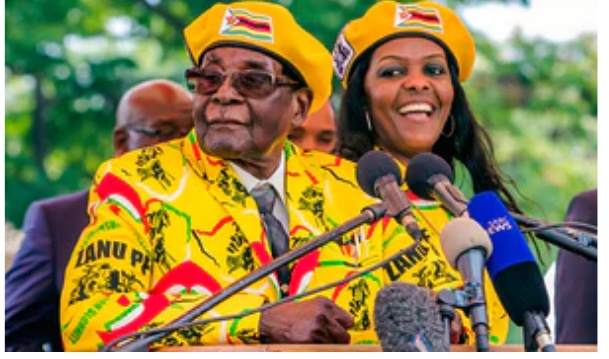Sacket Emmerson Mnangagwa says he will return to lead Zimbabwe, after fleeing in wake of abrupt removal from post.
Robert Mugabe is facing his biggest political challenge in almost two decades as opposition to his authoritarian 37-year rule over Zimbabwe gathers strength around the vice-president he fired this week.
Mugabe sacked his long-time ally Emmerson Mnangagwa on Monday for showing “traits of disloyalty”, abruptly removing a favourite to succeed the 93-year-old leader and boosting the likelihood of Grace Mugabe, the first lady, becoming his next deputy and and potential successor.
A close ally said on Wednesday that Mnangagwa had fled “assassins” for “a safe place” and would arrive in neighbouring South Africa later this week.
Mnangagwa, who fought alongside Mugabe in a guerrilla war and went on to become a feared security chief, said he had been “vilified beyond measure” and was being “hounded by minnows who have no liberation credentials”.
“I will return to Zimbabwe to lead you,” Mnangagwa said in a statement.
Chris Mutsvangwa, the chair of Zimbabwe’s association of war veterans, told reporters in Johannesburg that Mnangagwa, 75, would lead a campaign to “restore democracy” in the former British colony. The war veterans – former combatants in the wars of the 1970s – have been a key support base for M
Analysts said the threat to the president and those close to him was unprecedented because it came from within the ruling Zanu-PF party.
“Mugabe has faced challenges from outside before, but never an internal challenge. This time it is the machinery that has kept him in power that is now shuddering,” said Piers Pigou, an analyst with the International Crisis Group in Johannesburg.
Tensions were already rising in Zimbabwe amid a deteriorating economy and the vicious struggle around Mugabe’s succession. The sacking of Mnangagwa appears to have settled that contest in favour of the first lady, who is 52.Profile
Who is Grace Mugabe and why is she controversial?Show
Grace Mugabe is far from a popular figure in Zimbabwe. Her image has suffered after an alleged assault on a model she had found in the company of her sons in a luxury apartment in Johannesburg in September.
Granted diplomatic immunity after the incident, Grace Mugabe was allowed to leave South Africa despite a police inquiry. She denies any wrongdoing.
Reports of extravagant purchases, including property in South Africa and a Rolls-Royce, have also angered many Zimbabweans. Pictures of one of the first lady’s sons apparently pouring most of a bottle of champagne over a luxury watch worth tens of thousands of dollars in a nightclub were shared widely on social media this week.
Mutsvangwa, the head of the war veterans group, said Grace Mugabe was “a mad woman” who had won power through a “coup ... by marriage certificate”.
“She is a psychotic case … now she has obliged her senile and doting husband to leave power to her. The whole nation is outraged,” he said.
Until recently, Mnangagwa was tipped as Mugabe’s likely successor, partly because of his support within the country’s security establishment and among veterans of Zimbabwe’s 1970s guerrilla war.
Despite his alleged involvement in atrocities in the 1980s, Mnangagwa was also the preferred candidate of much of the international community, where he was seen as most likely to guarantee a stable transition and implement economic reforms.
Some observers doubt the extent of support for the former vice-president, who is hated in parts of the country. But there is deep discontent, and a protest is planned later this month to demonstrate the strength of support for Mnangagwa, his allies say.
Mutsvangwa ruled out trying to remove Mugabe by force and said war veterans would form a broad front with the opposition in elections next year.
“We don’t want to abuse the military to resolve a political problem. We don’t want them to become the arbiter of political power,” he said.
The feud between Mnangagwa and Grace Mugabe has been bitter and public. Last month the first lady, who leads the women’s league of Zanu-PF, publicly denied she was behind an alleged attempted poisoning of her rival.
Political activists in Zimbabwe say they hope the firing of Mnangagwa will unite a fractured opposition, while splitting Zanu-PF. The party is holding a special congress set for mid-December, and elections are due next year.
The Movement for Democratic Change (MDC) came close to winning power in 2000 and 2002, and won an election in 2008. Zanu-PF won a poll in 2013 that was marred by allegations of widespread rigging.
MDC activists said on Wednesday they were confident of winning any “free and fair” poll.
Pigou, the analyst, said: “Mugabe’s brinkmanship may have backfired but he still has a lot of cards up his sleeve.”
Fears of the return of hyperinflation have led to panic-buying and rocketing prices in Zimbabwe, while confidence in the parallel “bond note” currency, launched by the government nearly a year ago, has collapsed.
Mnangagwa was appointed vice-president in 2014, taking over from Joice Mujuru, who was axed after Grace Mugabe launched a campaign accusing her of plotting to topple the president.

